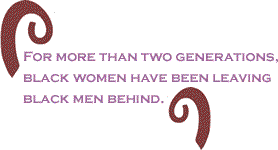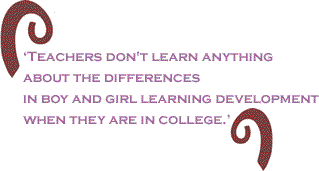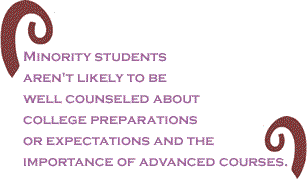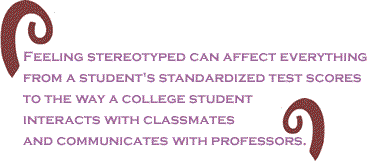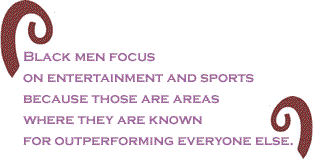
|
|||||||||||||||||||||
|
This article was first published in the April 9 issue of the Savannah
Morning News. Ishmere, a husky 14-year-old who was held back last year, files into a noisy, basic-level social studies class where all the students are black. Malcolm, a bespectacled 13-year-old with good grades, peels away from the pack for an accelerated French class, where most everyone is white. They are very different students, but Ishmere and Malcolm do have two things in common. They both dream of getting a college degree. And, odds are, they won't make it. Here's why:
Across the nation, struggling black male students like Ishmere and academic standouts like Malcolm, face a series of hurdles in school. They aren't taking courses that prepare them for college. Their teachers aren't prepared, emotionally or professionally, to work with them. They aren't challenged. Jobs and rap music are more appealing to them than education. Black females are clearing most of those hurdles. The credit for any statistical data reporting improvements goes to them. The overwhelming majority of black teen-age boys trip, fall and give up. Black women enroll in college and earn bachelor's and master's degrees two times more often than black men.
Nationally, most black males do well enough to earn high school diplomas, but that's generally their academic high point. What comes next is staggering economically, politically and socially. For more than two generations, black women have been leaving black men behind. They outnumber them in both undergraduate and graduate school and go on to outpace them in the professional world. Black men, in contrast, go on to have the highest unemployment rates of any ethnic group. One in four do prison time. Nearly half never marry, leaving 43 percent of black women to run households alone. But little has been done systemically to stop this slide. In fact, the academic gender gap has been growing for more than three decades. "This is huge social dynamite," said Kati Haycock, director of the education reform group The Education Trust. The fuse is lit every day in schools like DeRenne Middle. Opting Out Studious, soft-spoken Malcolm Tariq could compete academically with the very best at DeRenne Middle. But as he breezed through a quiz in his accelerated French class, it was clear why he doesn't.
It takes a 3.8 grade point average, a clear behavioral record and above average standardized test scores to qualify. Just 45 of the school's 302 black males are enrolled in the magnet program. These classes, which until recently were held in a separate wing, can appear to be uninviting, cliquish places. It is an atmosphere where class-conscious middle-schoolers can easily come to believe that the low proportion of black students is a sign of inferiority. "Many of our black males don't enroll because of their standardized test scores," said program coordinator Ze Santa Rita .
But there are black kids with the academic qualifications who aren't enrolled, according to Assistant Principal Betty Burnette, because they don't feel welcomed by the whites inside of the program. And, they are often ridiculed by the blacks on the outside. "They're teased and called nerds," Burnette said. "And their parents let them out of the program." According to psychologist Beverly Daniel Tatum's research of racial identity, black teens define themselves by what they see in videos and on television. Cultural stereotypes reinforce the assumption that academics are meant for whites. So, when black kids face an uninviting racial atmosphere, they turn to peers for support only to face further discouragement. If Malcolm enrolled as a magnet student, he'd have a head start on his college preparation. But he would also spend his days on the fringe of an academic clique where black teen boys are outnumbered 4 to 1. On a quiz day in his accelerated French class, Malcolm was one of just six blacks – three boys and three girls. They all sat quietly in one corner of the room near the door while their teacher gravitated to a crowd of blond girls huddled in the other half of the room. There was no interaction between the groups. Regular level social studies was a different world. Everyone, including the teacher, was black. And although the class wasn't particularly challenging, the atmosphere was fun and comfortable. Malcolm chooses to take just a few accelerated courses and then return to regular courses with the general student body. "They wanted me to (enroll in the magnet program) but I didn't want to," he said. "I like all of my classes." But a black student's chances for completing college hinge on the intensity of the courses he takes in school more than anything else, according to a U.S. Department of Education study. Finishing an upper level math course beyond Algebra 2 – trigonometry or pre-calculus, for example – more than doubles the odds that a student will complete a bachelor's degree. But young black men aren't taking enough accelerated courses. In Georgia, less than half even pursue a college prep diploma in high school. Lacking Preparation Ishmere McKinney is almost never prepared academically, but he clearly wants to be. "The truth is, kids want to do well," said Mary Catherine Swanson, founder of the Advancement Via Individual Determination (AVID) program. "But until they succeed with the best, they won't believe they're the best. They have to be able to compete, and their whole self-image changes." Ishmere is in with low-level students in large, loud and, at times, unruly classes at DeRenne. But he doesn't help his situation either. He often spends free class time rushing through homework from other courses that he failed to do the night before. His mother, Vickie McKinney, is a single parent. Neither she, nor Ishmere's father or 20-year-old brother went to college. Vickie wants Ishmere to succeed, but admits she sometimes struggles with his assignments herself.
When his social studies teacher, Calandra Patterson, asked for the definition of a fossil, Ishmere waved his hand frantically. She called on him, but he had to flip through his textbook in search of the answer. "You were supposed to define those words last night," his teacher said. "Didn't you do your homework?" "No," Ishmere replied, still face down in the book and flipping frantically. "Well," she said disappointedly, "Let's go to someone who did." Coming to school late with incomplete homework is just one part of Ishmere's struggle. "Many people want to blame parent participation for low achievement, but having poorly prepared teachers also leaves students at a disadvantage," said The Education Trust's Haycock. "All in all, that's much more important than what the parents do." Nationally, 21 percent of teachers at public schools with a 75 percent minority enrollment are new to the profession.
At schools with less than 10 percent minority enrollment, the percentage of inexperienced teachers is 14 percent, according to U.S. Department of Education statistics. The agency reports that new teachers are typically less effective, and that during their first few years on the job, their students have lower achievement scores. But even the best teachers aren't trained to address the specific academic needs of male students. "Teachers don't learn anything about the differences in boy and girl learning development when they are in college," said Tom Mortenson, a higher education policy analyst with Postsecondary Access. Ishmere's social studies teacher struggled to engage the group of 24 black students, but nine of them slept through the class. She offered candy and even told them the page and paragraph where they could find answers. But, by the end of class, she was taking deep calming breaths. "This is just temporary for me," she said. "I'm really a radio DJ." Bare Minimums The 2000 Condition of Education's Study of 1992 Graduates found that more than half of black high school graduates aren't fully qualified for admission to four-year colleges. For black males, that suggests they get the academic bare minimum. "Our system is largely set up for 100 years ago when all you needed was a high school diploma," said Michael Kirst, Stanford University professor and associate director of the Institute of Higher Education Research. "We're doing great by 1903 standards."
Few black males take advanced classes, which are more in line with college entrance requirements. Instead, they stick to classes that meet basic high school graduation requirements. About 60 percent of all black students stop at mid-level math courses, according to the U.S. Department of Education. Even if they earn high marks, the basics aren't designed to help them break 1,000 on the SAT or prepare them for college work. "They typically go through high school thinking everything is fine academically, only to have their college ambitions blow up in their faces when they attempt the SAT or college admissions exams," said Kirst. The best-prepared college students take accelerated courses in elementary and middle school. In high school they go beyond the basic college prep curriculum and take advanced placement courses. But minority students aren't likely to be well counseled about college preparations or expectations and the importance of advanced courses, Kirst said. Even middle-class blacks aren't always fully aware because they are typically first generation middle-class and don't travel in circles where these things are common knowledge. Malcolm's parents are business owners, but neither has a bachelor's degree. His father, who owns a clothing store and works for UPS, didn't finished college. His mother, a beauty shop owner, attended technical school. They support Malcolm's academics, but haven't pressed him to enroll in the magnet program, as his school counselor suggested. "I encourage him to make high grades in school and take all the higher level courses he can. It will help him later on in life," said Malcolm's mom, Teri Furman. "But we don't want to push him into something he's not comfortable with." Low Expectations It's hard to determine which came first, low teacher expectations or students' refusal to do work. But according to the research of University of California Berkeley professor John Ogbu, each feeds the other. In Ishmere's second period literacy class, the teacher's expectations are low, and the students' attitudes aren't much better. Every student at DeRenne is required to take the 45-minute literacy lesson to help raise his or her standardized test scores. The "easy class" is regarded as a joke to most upper level students like Malcolm. But the kids in Ishmere's class perceive it as an insult. The class is taught by the art teacher, in the paint- and plaster-speckled art room. The art teacher, Katherine Gardner, is white. The students are all black and primarily male. The eighth-graders in the class read childlike stories and answer simple questions out of the same blue book sixth-graders use. Carrying the blue workbook around school in their clear or mesh backpacks is a stigma. It is particularly bothersome to Ishmere, who is older than many of his classmates because he was held back in the seventh grade. "When I was in the sixth grade, this was the very first book I had. When I was in seventh grade, I had the green book two times, and now I'm back in the blue book again," Ishmere said. "The work is too easy."
Stanford University professor of psychology Claude Steele has researched the way students break down emotionally and academically when they think they are being stereotyped. "Stereotypes put a group under suspicion of not having the adequate ability in the domain of school performance, and it affects performance and persistence," Steele said. The cue could be as obvious as the blue sixth-grade reading book in Ishmere's class or as subtle as 15 white girls sitting on their side of the room in Malcolm's accelerated French class. But feeling stereotyped can affect everything from a student's standardized test scores to the way a college student interacts with classmates and communicates with professors, according to Steele. "Black kids can be shy in classroom discussion because if they make a mistake in conversation, it could be taken as a stereotype and confirmation of the belief that they are academically inferior," Steele said. "They think, 'I've just lost 40 IQ points in this professor's view of me,' and it can make them want to avoid doing some of the things that can prepare them for the test or course." But there are ways for schools to eliminate some of the stereotype tension, according to Steele. It involves building trust between teachers and students and protecting student identities and confidence in the classroom. The slow, choppy readers in Ishmere's literacy class had to read a short passage about baseball aloud. Then, in a slow, sarcastic tone, the teacher asked them multiple choice questions. But the students remained defiant. Three girls – talking loudly – barged in the door five minutes late. A wisecracking boy pulled a wad of dollar bills out of his pocket and slapped them down, one by one, on his desk, as if to dare the irritated teacher to yell. She eagerly obliged. "Pay attention!" she snapped. "If you don't, you'll be repeating this class again next year with the same book." Then she waved the blue book in the air for everyone to see. Ishmere and the others erupted in an angry chorus, "Not me! No way! That's what you think!" Images of Success For many young black men, work doesn't really get started until after school. In his research on minority education, Berkeley's Ogbu found that many black students, particularly males, allow extra curricular activities and work to take priority over class. When the school day ends, Ishmere takes a city bus downtown to look for job openings. He's underage, but he's optimistic. He may not be the most successful student, but with a little extra money, at least he can look like one. Last year, when he was 13, he held down a 5-11 p.m. dish-washing job at a Chinese restaurant, for about a week. Although some students use their income to help support their families, Ogbu found that many black males work solely to accumulate things. Ishmere wants to work so he can buy clothes and stop for chips and soda on his way home from school. "I don't like depending on people to buy me things," he said. "If I work, I won't have to ask my mother for clothes or shoes because she's kind of struggling right now."
Experts think black men choose work over college more than black women because it's easier for them to earn a livable wage with a high school diploma. They also find a steady paycheck more gratifying than the thought of four more years of school. The median income of black men with just a high school diploma is $23,158 a year compared with $18,341 earned by black women, according to census statistics. But it is not just instant financial gratification they seek. Many devote years to the pursuit of dreams of becoming sports or music celebrities. In their research on black manhood, psychologist Richard Majors and sociologist Janet Mancini Billson found that black men focus on entertainment and sports because those are areas where they are known for outperforming everyone else. Many young black men devote themselves to writing complex rhymes and developing beats that they hope will attract attention and make them rich, famous rap musicians. "This genre has captured the cultural identity interests of black males, and has pretty much taken over their lives," said Edmund Gordon, professor emeritus at Yale and Columbia universities and co-chairman of the National Task Force on Minority High Achievement. "It's a preoccupation." But it is also one of the few arenas where young black men are the leaders and innovators. It is a field where they are admired, encouraged to be creative, expressive and unique. Ishmere seeks a place in that spotlight. He wants to be a singer/actor/artist and won't hesitate to belt out a tune or pass around the portfolio of crumpled pencil drawings stuffed in his backpack. "He'll do anything for attention – even if it's negative attention," said DeRenne chorus teacher Beryl Dandy. Ishmere wants to earn a competitive slot at Savannah Arts Academy, the local performing arts high school. He lacks the academic requirements for entry and the discipline and motivation of a serious artist. But he dabbles in various genres, as if his grades and behavior might somehow be overlooked if someone notices how much he wants it. He wrote a play for his church youth group; he sings; he draws. He even spent some time trying to get acts together for a student talent show he wanted to organize at DeRenne. But his artistic pursuits – like his academic ones – lack effort and guidance and seem to fizzle before they really catch fire. By mid-year, Ishmere had to leave DeRenne and enroll at Scott Learning Center — an alternative school for problematic and expelled middle schoolers. "The problems just escalated," his mom said. "He had a couple of teachers he had conflicts with, and it was hard for him to get along with the kids in his classes. They tried moving him to different classes, but it didn't get any better." But the alternative school is another major setback. The change means more temptation and more distractions. On Ishmere's cross-town bus ride home, the kids are wild and unruly. When they turned a crowded corner that ran past a liquor store, 10 hands shot out of the bus window and flashed gang signs. "The behavior of the kids there is worse than at DeRenne," Ishmere said. "I just keep to myself and don't talk to anybody." But all of that doesn't mean it's too late for Ishmere. He can still develop the skills he needs to be among the 23 percent of his black male peers who go to college. He and Malcolm have four years of high school to prepare for the demands of higher education. Given quality counseling, guidance and academic support, students willing to take on the most challenging courses in high school are prepared to earn two- or four-year college degrees, according to AVID's Swanson. It takes hard work, high expectations and focused direction, but there is no reason why black males can't go on to earn more than just 3 percent of all the bachelor's degrees awarded nationally, she said. "It's such a travesty in our schools, and it can easily be changed." Jenel Few is Higher Education Reporter for the Savannah Morning News. Contact her at [email protected] |
May
6 2004 |
|||||||||
|
|||||||||
|
|
|||||||||
| Printer Friendly Version | |||||||||
 |
|||||||||
| |
|||||||||
| |
|||||||||























